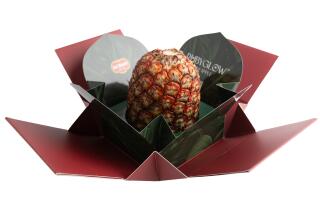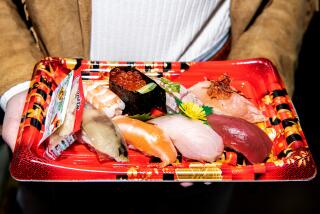U.S. Apples Try for Another Slice of Japan : Pacific Rim: After a year of lackluster sales, American exporters are scaling back expectations and tailoring the fruit to appease the sweeter tooth of the Asian nation.
- Share via
TOKYO — After getting only a small slice of the Japanese market in their first season, U.S. apple growers are trying again.
But they have a major problem to overcome: Many Japanese consumers don’t seem to think that Delicious apples from Washington state live up to their name.
“They look beautiful but they taste bad,” Tokyo grocery store owner Shoji Iwasaki said last week as Washington apples officially went on sale in Japan for their second season.
Last January was the first time American apples went on sale in Japan since Tokyo lifted a decades-old ban on the fruit. Encouraged by heavy media coverage, Japanese flocked to their supermarkets and bought about 7,000 tons of apples in just a month.
But then the U.S. fortunes turned sour. Customers complained that Washington apples didn’t have the sweet, juicy taste of their Japanese competitors.
U.S. growers also failed to seize a price advantage, as Japanese growers fought back by selling at a discount less-than-perfect apples that previously would have been turned into apple juice.
The result was a plunge in sales during February and March. By the time the season ended March 31, only 9,000 tons were sold, well below original projections of 12,000 to 15,000 tons.
This time U.S. apple exporters are scaling down expectations by not giving a target figure, and they’re tailoring the fruit closer to what Japanese seem to want.
“The Japanese consumer definitely has a sweet tooth,” said Brent Evans, Asia marketing director for the Washington Apple Commission.
He said it’s easy to make apples sweeter by leaving them on the tree a few weeks longer, and that’s what Washington growers have done this year.
Another factor that may have turned Japanese buyers off was the waxing that Washington growers add to give apples a bright red sheen.
To Japanese eyes, Evans said, the waxed U.S. apples may have looked unnaturally shiny, almost like candy. This time, many of the apples being imported aren’t waxed.
“It’s fair to think of the Red Delicious apples this year as a completely different product from the ones you ate last year,” said Jimmy Uehara, a Washington state apple official in Tokyo.
But the lingering bad taste is having an impact. Daiei, Japan’s biggest supermarket chain, sold 1,400 tons of U.S. apples last season after setting a target of 1,900 tons. This time, said spokeswoman Haruko Toyama, it only plans to sell 490 tons.
“We sold them last year, but we’re not going to do so this year,” said Seiki Sasaki, the owner of a fruit store in Tokyo’s Shinjuku district. “Of the people who bought [U.S. apples] last year, not a single one came back to buy again.”
Washington officials also still find it difficult to compete on price. Daiei is selling a 7.7-ounce apple for about 77 cents, but it’s possible to buy a much larger Japanese apple in a bag of four or six for just under $1 apiece.
“We’re kind of at the mercy of importers,” Evans said. “We’d love to get the product here as cheaply as possible.”
Meanwhile, technical talks with the Japanese government about importing new varieties of Washington apples still are at an early stage, said Mark Dries of the U.S. Embassy in Tokyo. Currently only imports of Red Delicious and Golden Delicious are permitted.
Dries declined to estimate how many years it will take until Fuji and other varieties from Washington are approved for sale in Japan.
“I have no doubt that over time there’s quite a good market here,” Evans said. “It just takes patience.”
More to Read
Eat your way across L.A.
Get our weekly Tasting Notes newsletter for reviews, news and more.
You may occasionally receive promotional content from the Los Angeles Times.










